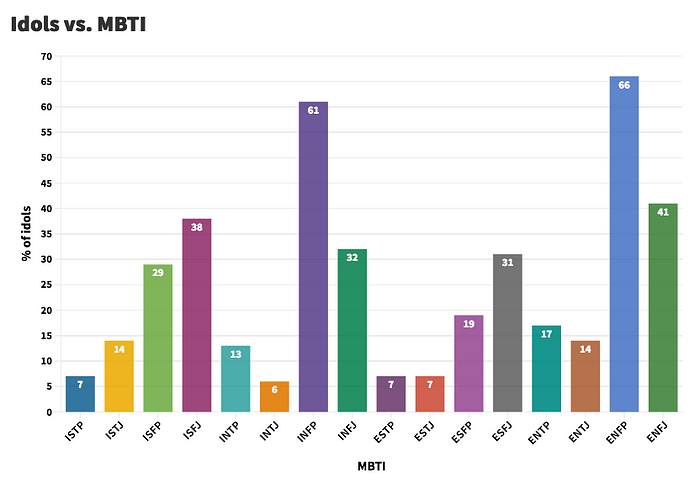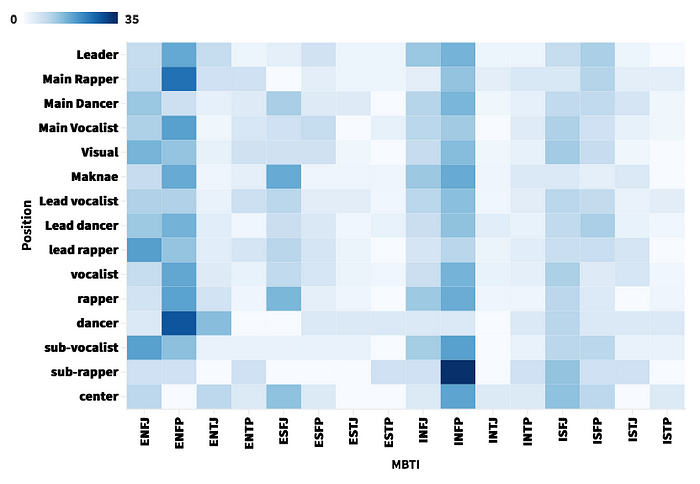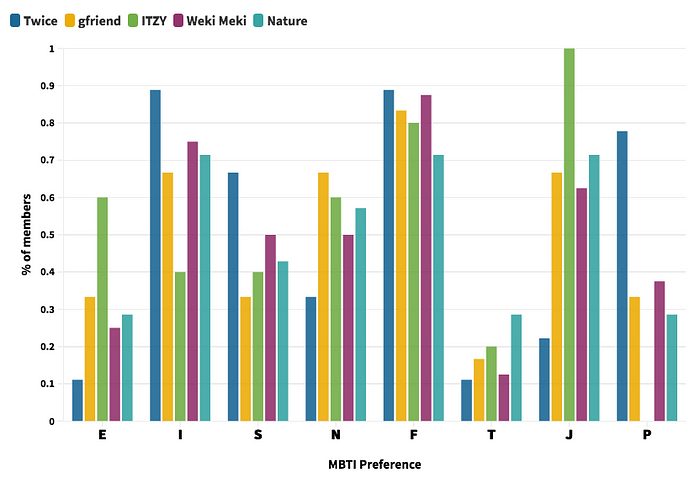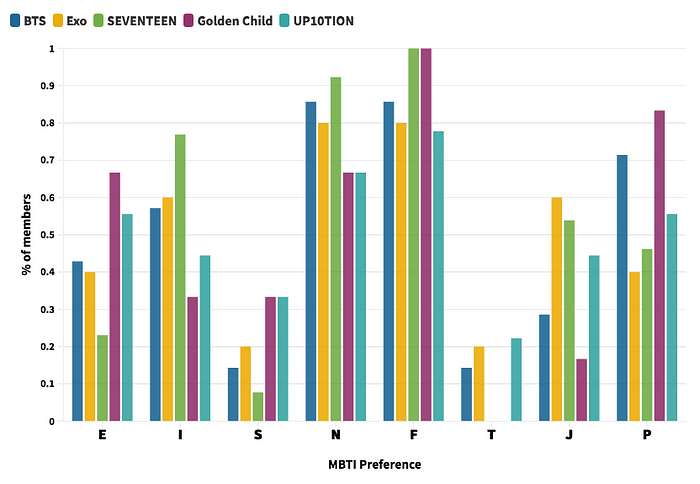If you’re a fan of any Kpop group (or anything in general), you want to know as much as you can about the members. Little peaks at the person behind the idol are often some of the fans’ favorite things about Kpop groups. One of those little details comes in the form of the Myers Briggs Type Indicator (MBTI) personality test. This test is used to sort you into one of 16 potential personality types based on your preferences in four categories. You can use this description to summarize things like if you’re an extrovert vs. an introvert or whether you are motivated by feelings or logic.
Of course, this personality test is fairly subjective: people can’t be easily sorted into 16 categories. And there’s plenty of instances of people having their personality type change based on the passage of time or even which website you take the test from. There are so many disclaimers, but ultimately remember: MBTI is pseudoscience and mostly for fun. But since this test is so ubiquitous and popular, I was wondering whether I could see if Kpop idols tend to skew towards a particular personality type or dichotomy.
So I collected the MBTI for 400 idols spanning across all generations of Kpop. I’ve put them in the spreadsheet here, organized by personality type and then alphabetically by group name. Again, I want to emphasize that there are plenty of potential inaccuracies: personality types change (Taeyeon went from ISFJ to INFJ), some tests aren’t as legit as others (Red Velvet’s latest types come from them matching their Trolls characters), and some sources come from random VLIVEs that are only pointed out by Twitter stans. But, with a decently large sample size, hopefully those potential issues won’t be as big of a deal.
So right away, it’s evident that any personality type can be a Kpop idol. I’m not going to describe each personality type, but I will be adding descriptions where they are necessary. There are some fairly infrequent types (ISTP, INTJ, ESTP, and ESTJ), which does seem to suggest that people with T preference (Thinking, deciding by logic rather than feeling (F)) don’t become idols as frequently as other personality types. In addition, the two most common personality types are INFP and ENFP — suggesting to us that introversion/extroversion don’t really matter.
ENFPs are known as campaigners (according to 16personalities.com). Campaigners “crave creativity and freedom” and “bring an energy that often thrusts them into the spotlight.” That description sounds quite similar to an idol, but it’s not perfect: campaigners apparently do not do well in regimented systems. And we all have to acknowledge that Kpop is a fairly controlled system. INFPs are the mediators: they are able to “communicate deeply” and “have a talent for self-expression.” But mediators seem to struggle in high-stress and busy environments, which popular idols often have to face.
Clearly, any one particular personality type doesn’t necessarily apply for idols. It’s hard to draw conclusions from looking at the 16 personalities. Let’s break it down by preferences (each letter) instead.
As a reminder, though there are eight preferences, there are actually four pairs. Each MBTI type uses one of the two options from each pair to describe a personality: so between E and I, you can only be one of those. As mentioned earlier, E (extroversion, get energy from being social) and I (introversion, get energy from being alone) does not seem to matter for Kpop idols since there is just as many of one as there is the other. For the most part, this also holds true for J (judging, structured or likes order) and P (perceiving, goes with the flow or spontaneous). The largest gaps appear in the S/N pair and the F/T pair.
As seen in the least common MBTI type, most idols don’t appear to be people driven by thinking, and prefer feeling. This isn’t too surprising: feeling is typically associated with being driven by compassion and a desire for harmony over logic or facts. You always hear about how thankful idols are for their fans and how they feel rejuvenated and motivated by them. Feelers like to help others and are devoted. You could dismiss this as simply being the job of the idol to be indebted to their fans and to emotionally invest themselves into the well-being of their audiences. Even so, it’s sensible for most idols to be Feelers.
The next preference pair result is a little less clear. Most idols identify as N (intuition) over S (sensing). It’s harder for me to relate this pair to idols. People with N tend to like thinking through problems whereas sensors like to experience problems first-hand. Sensors are more down-to-earth and like to be more practical. The intuitive type (borrowing this site ‘s phrase) are described as more imaginative and like to think about the future. In that sense, you can loosely relate idols to intuition: Kpop idols are people who aspire for large goals, like being an idol for a very large audience, and choose to imagine/hope for a big future. A more sensing individual may stay away from this career path due to how difficult and unlikely they are to succeed.
To make sure these % comparisons are applicable for idols, we need to make sure that the % distributions are different from that of the general population. If the percents in each preference pair match that for all people, then they aren’t specifically tied to Kpop idols.
Sure enough, the E/I is similar between the general population and idol groups. J/P is also fairly similar, though they are swapped (idols are more perceiving than judging). And the large discrepancies come from the previously discussed preference pairs. Unlike the general population, idols are more intuitive and feeling. Though 400 isn’t the largest sample size, these results do suggest that people who have personality types containing N and F are more likely to be idols than those with S and T.
We could stop here, but I wanted to answer two more questions about MBTI: we see what types of people become idols, but how does MBTI affect the people who are already idols? I also collected each idol’s position in their group to see if MBTI impacts what position they occupy within the group. These positions were taken from kprofile.com, which don’t source their positions so take them with a grain of salt. The other large issue is that members often occupy numerous positions. I was hoping to separate dancers from vocalists, but members often occupy a mix of roles.
There’s a lot of potential positions (just for the role of vocalist, there are the following descriptions: main vocalist, lead vocalist, vocalist, and sub-vocalist). I chose to use a heat map to help you identify areas where there is a large concentration of a personality type in a single position.
So what immediately sticks out is the vocalist row: this row is the most populated. This is because Kpop groups are of course, singing/performing groups. Even if they are the designated rappers or dancers in their groups, companies will usually still label them with vocalist at the very least. So those numbers are a little inflated. In particular, ENFP and INFP have the most vocalists; but remember that these are also the most common personality types among idols. In the next figure, I plot the distribution of vocalists based on MBTI.


You can see that the relative heights are fairly similar, despite one graph accounting for all idols and one accounting for just vocalists. Most of the positions fall into this trap, so the heat map isn’t nearly as informative as I had hoped. Let’s break it down further by looking at %. There’s two ways of looking at this: % by position (what % of leaders are ENFJ?) and % by MBTI (what % of ENFJ are leaders?). I show both below.


These plots aren’t the easiest to read, so I’ll cover the most notable highlights here. The top map is % by MBTI (you should read this vertically) and the bottom map is % by position (you should read this horizontally). In the top plot, the vocalist row is the darkest since the most common position is vocalist. ISTJs have the highest concentration of vocalists (28% of ISTJs are vocalists). 21% of ISTPs are lead vocalists (more ISTPs are lead vocalists than vocalists). There are a few other peaks or hot spots — you can see the values by going to the spreadsheet. Interestingly enough, there is some variance in the % by MBTI, but it’s hard to conclude anything too definitive.
In the bottom plot, we see that the darkest columns are ENFP and INFP, which are the most common MBTIs. Other notable hot spots: 19% of lead rappers are ENFJs (higher than ENFP or INFP). 33% of sub-rappers are INFP. 25% of main rappers are ENFPs. There are a few other hot spots, but the difficulty in analyzing or concluding things based on specific roles is that none of these percentages account for a majority. However, the % by role plot is fairly similar across all roles, so there likely isn’t any notable relationship. There might be a few exceptions, but it seems like MBTI doesn’t strongly influence specific positions.
We try to simplify this analysis by consolidating many of the positions to rappers, dancers, and vocalists (i.e. grouping all of the main, lead, and sub into one group). And then we choose to break it down by preference (E, I, S, etc.).
Sure enough, the relative heights of these bar charts are all similar regardless of position. This indicates that the distribution of MBTI preference over each position is not changing even when isolating using position. The frequency of positions goes vocalists > dancers > rappers. But there is no clear impact of MBTI on what position a Kpop idol occupies in a group.
Next, I was wondering, is there anything MBTI-related that separates top groups from other Kpop groups? To determine this, I group a few of the top Kpop groups (BTS, Twice, Exo, GFRIEND, ITZY, SEVENTEEN) and compare them to some less successful groups (Weki Meki, Nature, Golden Child, UP10TION).


In these bar charts, I compare the % of members who have each MBTI preference between different groups. And if you’re looking at this graph and thinking that you can’t find anything worth pointing out, you’re right. When comparing all these groups, there wasn’t really any significant difference between the top groups and the less successful ones in terms of the members’ MBTIs. Yeah, Twice has seven perceiving members which might say indicate that having perceiving members is the reason for success. But neither ITZY nor GFRIEND have a majority perceiving members, so that isn’t a likely hypothesis. Significant differences among top groups aren’t repeated in the other top groups, and there is plenty of overlap between the less successful groups and the more successful ones. This may change if we were to look at every single group, but I predict that a deeper dive won’t yield any contrary evidence.
Does MBTI really affect Kpop idols? No. Any type of personality is fit for an idol. Sure, there are some more intuition and feeling preferences among idols, but that is likely true for any role that involves performing and being in the spotlight. MBTI is ultimately a pseudoscience that is very inconsistent. But we want to know our favorite idol’s MBTI because we’re curious, not because we are taking this as fact.
Also, please don’t @ me with a member’s position or MBTI being wrong: it’s honestly really fluid and as LOONA’s Hyunjin likes to say:
Originally published at http://paukshop.wordpress.com on July 24, 2020.







